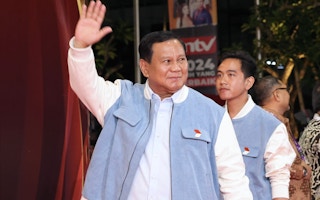“No one should teach Indonesia about climate change,” said the country’s likely next President, Prabowo Subianto, at the Mandiri Investment Forum 2024 last week. Environmental activists are worried about this statement. Prabowo’s statement implies that the new government under Prabowo and his vice-president pick, Gibran Rakabuming Raka, will reject suggestions from various parties regarding handling the climate crisis.
As a matter of fact, the climate crisis is a concern for people around the world. Climate disasters have occurred throughout the world, including in Indonesia. People around the world, including Indonesians, have been victims of climate disasters. People around the world not only have the right but are also obliged to speak as loudly as possible to policy makers in countries around the world, including Indonesia, to deal more seriously with the climate crisis.
As an archipelagic country, Indonesia is relatively vulnerable to the climate crisis. However, as a coal exporter, Indonesia also has a responsibility to reduce greenhouse gas (GHG) emissions, the cause of the climate crisis. This is not a challenge Indonesia can overcome by itself. Collaboration with various parties, including foreign countries, international institutions and civil society organisations, is a necessity. Prabowo’s statement at the Mandiri Investment Forum clearly sends a bad signal on Indonesia’s climate policies in the next five years.
Beside his statement last week, there are also other signs that Indonesia’s climate crisis policy is not on the right path. For instance, Prabowo has said he wishes to continue outgoing President Joko Widodo’s (Jokowi) development model or Jokowism.
The Jokowism development model is based on the anthropocentrism paradigm, which places human interests at the centre of everything. As a consequence, nature is only seen as fulfilling unlimited human interests, which leads to the destruction of biodiversity.
One example of this in the Jokowism model is the destruction of forests for failed food estate projects. Prabowo and Gibran have stated that they would continue this project, which had targets of expanding farmlands by hundreds of thousands of hectares nationwide but has been criticised for abetting deforestation.
Jokowism will also give rise to false solutions to the climate crisis. One such false solution is Carbon Capture and Storage (CCS).
At the end of January, President Jokowi issued Presidential Regulation 14 of 2024 concerning the Implementation of Carbon Capture and Storage Activities. This presidential decree will become a legal umbrella for CCS activities in Indonesia. But the use of CCS technology will only extend the lifespan of fossil energy and make it more difficult to develop renewable energy.
Prabowo’s track record in the energy sector also points to policies heading the wrong direction when it comes to the climate crisis in the next five years. According to the Mining Advocacy Network (JATAM), as written on its website, based on the company deed, Prabowo is the sole shareholder in PT Nusantara Energy. The coal company has a concession area of 4,793 hectares in Berau, East Kalimantan.
Prabowo Subianto, according to JATAM records, is also a shareholder of PT Nusantara Kaltim Coal, which was founded in 2005. PT Nusantara Kaltim Coal has a coal mining concession covering an area of 11,040 hectares in East Kutai Regency, East Kalimantan.
In the previous presidential election in 2019, Prabowo also received support from capital owners in the fossil energy sector, including coal mining. Even the coal mining magnate, PT Adaro Energy Indonesia Tbk (ADRO) chief executive officer Garibaldi ‘Boy’ Thohir, confidently expressed his support for Prabowo Subianto – although a few days later, a company spokesperson said Garibaldi’s statement at the Erick Thohir Alumni of the United States event was personal opinion, not representing the opinion of all ADRO employees.
The key question is whether in the next five years, the public can rely on Prabowo to seriously end Indonesia’s dependence on dirty coal energy and switch to renewable energy, if he is part of the coal industry itself. Is it possible that Prabowo will be able to control the interests of himself and those close to him, who have businesses in the fossil energy industry? The answer: very difficult, but perhaps not impossible.
Prabowo and Gibran’s wrong direction in handling the climate crisis is also evident in their vision and mission documents while campaigning in the past months. The Prabowo-Gibran pair stated that they would prioritise green energy originating from palm oil.
Palm oil-based green energy is very problematic, as it has the potential to accelerate the expansion of palm oil plantations into forests. Deforestation rates will certainly increase. Not only will that worsen our biodiversity loss, but also make Indonesia the largest contributor of greenhouse gases from the forestry sector.
The wrong direction in Prabowo-Gibran’s climate policies is clearly visible. If the Indonesian public is silent, our efforts to be involved in saving the earth will not only go stagnant but will also go backwards. As a result, the public, as taxpayers, will suffer the consequences of misdirected climate crisis policies. Climate disasters will increase. That means the public will be increasingly vulnerable to becoming victims.
Firdaus Cahyadi is the interim Indonesia Team Lead for climate campaign group 350.org.


















